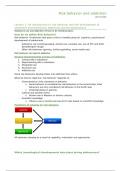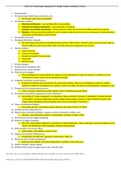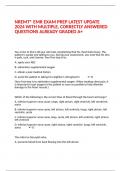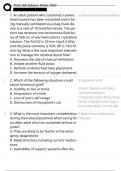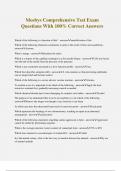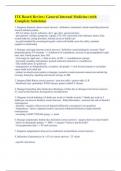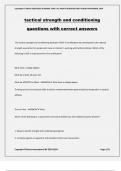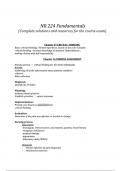BUSINESS PRACTICE AND WORK PLACE ETHICS - ( BWE1501 STUDY NOTES )
Study Unit 1: The Legal Profession
A paralegal is not a legal professional (lawyer).
A paralegal has a basic knowledge of the law.
A paralegal obtains his/her legal skills or knowledge through education, training and work
experience.
A paralegal works under the supervision of a legal professional.
A paralegal can be employed at different place.
Legal professional (lawyer) - Has a law degree
Paralegal - Does not have a law degree but has one or more of the following:
A paralegal diploma Received informal legal training Practical legal experience
Attorney - Works at a law firm / Works directly with clients/ Does all types of legal work.
Advocate - Does not work at a law firm/Receives work from an attorney/Specialises in court
work
Law Firm Paralegals - Works at a law firm/Works under the direct supervision of an attorney
Community-Based Paralegals - Works at a community centre/Works independently but refers
work to an attorney where necessary.
What do attorneys do?
Consult with clients to take instructions and provide legal advice.
Research legal principles applicable to a specific case,
Draft legal documents (e.g. legal opinions, court documents and contracts).
Vet legal documents (e.g. legal opinions, court documents and contracts),
Correspond with clients, advocates, opposing parties and government institutions.
Appear in courts or other tribunals on behalf of clients.
Attend to legal negotiations and settlement talks.
Admission Requirements.
Attorneys
Before someone may practice as an attorney, that person must be admitted as an attorney by
the High Court. The Attorneys Act prescribes the minimum requirements that must be met
before the High Court may admit someone as an attorney. The main requirements can be
summarised as follows
, The candidate must be 21 years of age or older.
The candidate must be a South African citizen or have the right of permanent residence in
South Africa and be an ordinary resident of South Africa.
A candidate must have an LLB degree before he or she can be admitted as an attorney.
An LLB degree is a bachelor’s degree in law which takes a minimum of four years to complete.
There are exceptions to the above rule (e.g. if someone studied law overseas), but all of these
exceptions require a formal law degree.
The candidate must be regarded as a fit and proper person.
This means that the candidate must have the necessary personal attributes to practise as an
attorney. This refers to the moral integrity (especially honesty) of the candidate and the
candidate must state that he or she has not committed any criminal offence. This does not
mean that you are automatically disqualified from entering the attorney profession if you
have been convicted of a criminal offence, as it is up to the court to assess whether you are a
fit and proper person. However, you will have to explain the circumstances surrounding the
criminal conviction as well as provide the court with proof that you have been rehabilitated.
Before the candidate may be admitted as an attorney, he or she must have the necessary
practical experience, which is usually served under articles of clerkship. This means that the
candidate must work under the supervision of an experienced attorney on a full-time basis.
The service period differs from between one and five years depending on different factors. To
qualify for a shorter period of service, the candidate may attend a full-time school for legal
practice for a period of six months. A person serving under articles of clerkship is called a
candidate attorney or an articled clerk. The supervising attorney is called a principal. Before
the Law Society will register articles of clerkship, the candidate must be interviewed by a
senior member of the Law Society (i.e. a senior practising attorney) in order to establish
whether or not the candidate is a fit and proper person. The main focus of the interview is to
establish whether or not the candidate has any previous criminal convictions.
The candidate must have successfully completed the four prescribed attorneys’ admission
examinations. These examinations are practically orientated and a candidate must have
completed either a period of six months’ service under his or her articles of clerkship or he or
she must have attended a full-time school for legal practice for a period of six months before
he or she may write these examinations.
The candidate must attend a compulsory practical legal training course. The course can be
either a full-time school for legal practice for a period of six months or the short course
offered by the Law Society for five weeks during or after the service period under the articles
of clerkship.
, As you can see from the above, there are many requirements that must be met before
someone may be admitted and practise as an attorney. The requirements involve formal legal
training, practical training and practical experience. These requirements are all aimed at
ensuring skilled attorneys are produced who can assist the public with legal problems. Once
the candidate is admitted by the High Court to practise as an attorney, the attorney’s name is
entered onto the roll for attorneys which is a register kept by the Registrar of the High Court
of all the names of the attorneys admitted by that court.
Conveyancers and notaries
Conveyancing deals with rights in respect of immovable or fixed property, for example the
ownership of a farm or a house. Conveyancers attend to the registration of ownership and
other rights in immovable property at the Deeds Office and the drafting of the documents
necessary for such registration.
Notary practice refers to the practice of drafting, executing and registering notarial deeds.
Notarial deeds are also registered at the Deeds Office. Notarial deeds are specialised legal
documents that must be executed (signed) by a notary. Examples of notarial deeds include
ante nuptial contracts, trust instruments and deeds of donation. Notaries are obliged to keep
a record of all the notarial deeds executed by them. This record is called a protocol.
Only attorneys may be admitted as conveyancers and notaries after they have passed the
required examinations. After an attorney has passed the conveyancing or notary examination,
he or she may apply to the High Court to be admitted as a conveyancer or a notary. His or her
name will then be entered onto the rolls for conveyancers or notaries that are kept by the
Registrar of that specific High Court.
Professional associations
Law Society of South Africa - The Law Society of South Africa is a statutory body created by
the Attorneys Act and aims to represent, promote and educate the attorney profession in the
public interest. It also regulates the profession. The Law Society of South Africa can be divided
into the following law societies:
- The law society of the Northern Provinces
This law society covers Gauteng, Limpopo, Mpumalanga and the North West Province areas.
- The law society of the Free State
This law society covers the Free State Province area.
- The cape law society
This law society covers the Northern, Eastern and Western Cape Province areas as well as the
former Transkei and Ciskei areas.
Study Unit 1: The Legal Profession
A paralegal is not a legal professional (lawyer).
A paralegal has a basic knowledge of the law.
A paralegal obtains his/her legal skills or knowledge through education, training and work
experience.
A paralegal works under the supervision of a legal professional.
A paralegal can be employed at different place.
Legal professional (lawyer) - Has a law degree
Paralegal - Does not have a law degree but has one or more of the following:
A paralegal diploma Received informal legal training Practical legal experience
Attorney - Works at a law firm / Works directly with clients/ Does all types of legal work.
Advocate - Does not work at a law firm/Receives work from an attorney/Specialises in court
work
Law Firm Paralegals - Works at a law firm/Works under the direct supervision of an attorney
Community-Based Paralegals - Works at a community centre/Works independently but refers
work to an attorney where necessary.
What do attorneys do?
Consult with clients to take instructions and provide legal advice.
Research legal principles applicable to a specific case,
Draft legal documents (e.g. legal opinions, court documents and contracts).
Vet legal documents (e.g. legal opinions, court documents and contracts),
Correspond with clients, advocates, opposing parties and government institutions.
Appear in courts or other tribunals on behalf of clients.
Attend to legal negotiations and settlement talks.
Admission Requirements.
Attorneys
Before someone may practice as an attorney, that person must be admitted as an attorney by
the High Court. The Attorneys Act prescribes the minimum requirements that must be met
before the High Court may admit someone as an attorney. The main requirements can be
summarised as follows
, The candidate must be 21 years of age or older.
The candidate must be a South African citizen or have the right of permanent residence in
South Africa and be an ordinary resident of South Africa.
A candidate must have an LLB degree before he or she can be admitted as an attorney.
An LLB degree is a bachelor’s degree in law which takes a minimum of four years to complete.
There are exceptions to the above rule (e.g. if someone studied law overseas), but all of these
exceptions require a formal law degree.
The candidate must be regarded as a fit and proper person.
This means that the candidate must have the necessary personal attributes to practise as an
attorney. This refers to the moral integrity (especially honesty) of the candidate and the
candidate must state that he or she has not committed any criminal offence. This does not
mean that you are automatically disqualified from entering the attorney profession if you
have been convicted of a criminal offence, as it is up to the court to assess whether you are a
fit and proper person. However, you will have to explain the circumstances surrounding the
criminal conviction as well as provide the court with proof that you have been rehabilitated.
Before the candidate may be admitted as an attorney, he or she must have the necessary
practical experience, which is usually served under articles of clerkship. This means that the
candidate must work under the supervision of an experienced attorney on a full-time basis.
The service period differs from between one and five years depending on different factors. To
qualify for a shorter period of service, the candidate may attend a full-time school for legal
practice for a period of six months. A person serving under articles of clerkship is called a
candidate attorney or an articled clerk. The supervising attorney is called a principal. Before
the Law Society will register articles of clerkship, the candidate must be interviewed by a
senior member of the Law Society (i.e. a senior practising attorney) in order to establish
whether or not the candidate is a fit and proper person. The main focus of the interview is to
establish whether or not the candidate has any previous criminal convictions.
The candidate must have successfully completed the four prescribed attorneys’ admission
examinations. These examinations are practically orientated and a candidate must have
completed either a period of six months’ service under his or her articles of clerkship or he or
she must have attended a full-time school for legal practice for a period of six months before
he or she may write these examinations.
The candidate must attend a compulsory practical legal training course. The course can be
either a full-time school for legal practice for a period of six months or the short course
offered by the Law Society for five weeks during or after the service period under the articles
of clerkship.
, As you can see from the above, there are many requirements that must be met before
someone may be admitted and practise as an attorney. The requirements involve formal legal
training, practical training and practical experience. These requirements are all aimed at
ensuring skilled attorneys are produced who can assist the public with legal problems. Once
the candidate is admitted by the High Court to practise as an attorney, the attorney’s name is
entered onto the roll for attorneys which is a register kept by the Registrar of the High Court
of all the names of the attorneys admitted by that court.
Conveyancers and notaries
Conveyancing deals with rights in respect of immovable or fixed property, for example the
ownership of a farm or a house. Conveyancers attend to the registration of ownership and
other rights in immovable property at the Deeds Office and the drafting of the documents
necessary for such registration.
Notary practice refers to the practice of drafting, executing and registering notarial deeds.
Notarial deeds are also registered at the Deeds Office. Notarial deeds are specialised legal
documents that must be executed (signed) by a notary. Examples of notarial deeds include
ante nuptial contracts, trust instruments and deeds of donation. Notaries are obliged to keep
a record of all the notarial deeds executed by them. This record is called a protocol.
Only attorneys may be admitted as conveyancers and notaries after they have passed the
required examinations. After an attorney has passed the conveyancing or notary examination,
he or she may apply to the High Court to be admitted as a conveyancer or a notary. His or her
name will then be entered onto the rolls for conveyancers or notaries that are kept by the
Registrar of that specific High Court.
Professional associations
Law Society of South Africa - The Law Society of South Africa is a statutory body created by
the Attorneys Act and aims to represent, promote and educate the attorney profession in the
public interest. It also regulates the profession. The Law Society of South Africa can be divided
into the following law societies:
- The law society of the Northern Provinces
This law society covers Gauteng, Limpopo, Mpumalanga and the North West Province areas.
- The law society of the Free State
This law society covers the Free State Province area.
- The cape law society
This law society covers the Northern, Eastern and Western Cape Province areas as well as the
former Transkei and Ciskei areas.

